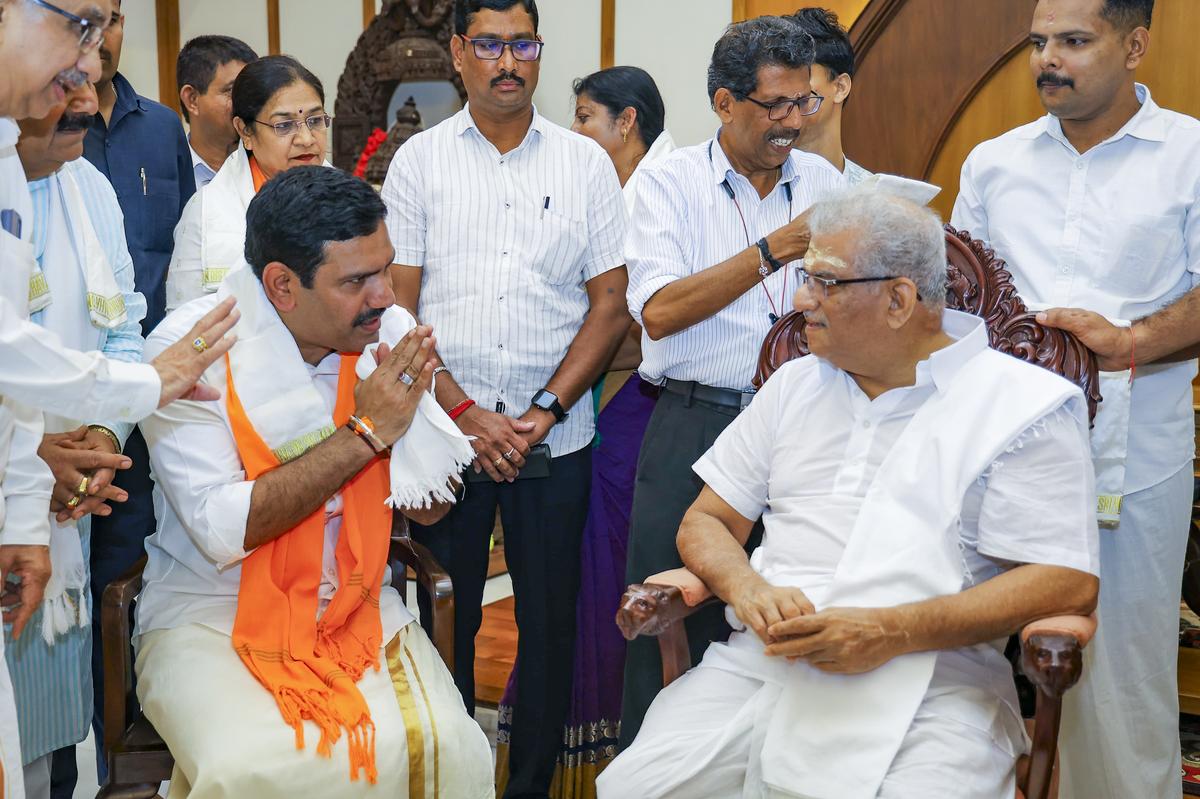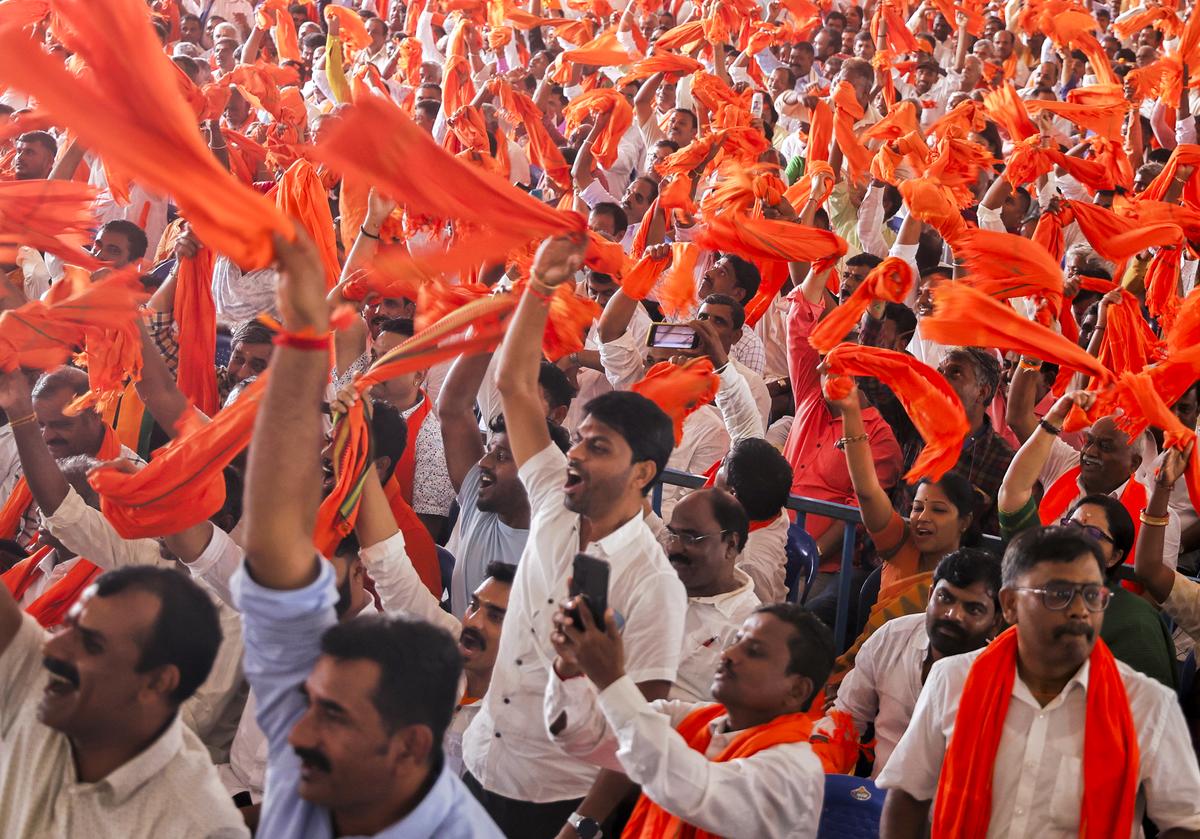The Bharatiya Janata Party (BJP) has come out strongly against what it calls a “sinister campaign” being orchestrated against the revered town of Dharmasthala, alleging that the Congress party is behind a larger conspiracy targeting the faith and beliefs of the majority community. According to BJP leaders, the misinformation being spread about Dharmasthala and its institutions is not a coincidence but part of a carefully crafted narrative to undermine trust in long-established religious and social traditions. This accusation has sparked sharp debates across Karnataka, with emotions running high among devotees, political observers, and community leaders.
The BJP maintains that Dharmasthala has for centuries been a symbol of cultural integration, spiritual guidance, and community service. Alleging a direct attack on this legacy, the party leaders argue that Congress is intentionally attempting to weaken majority sentiment by spreading distorted narratives around temple management and finances. They claim such acts are designed to create discontent among the public while subtly eroding the deep-rooted trust people place in Dharmasthala’s institutions. This charge has galvanized BJP cadres, who have vowed to “protect the sanctity of faith” and stand firm against what they call politically motivated assaults.
Congress, however, has strongly rejected these claims, calling them “baseless political drama” aimed at diverting attention from governance issues and scandals surrounding the BJP itself. According to Congress leaders, raising religious sentiments in this manner is a calculated electoral tactic, designed to polarize communities ahead of upcoming local and state elections. Political experts note that this confrontation reflects a broader strategy where both parties seek to position themselves as guardians of culture and faith, turning Dharmasthala into a symbolic battleground for competing narratives.
BJP’s Emotional Defence of Dharmasthala’s Legacy
At the heart of BJP’s rebuttal is the argument that Dharmasthala represents more than just a temple town—it embodies centuries of devotion, charity, and community building. Party leaders have highlighted the extensive educational institutions, health care initiatives, and cultural preservation activities supported by Dharmasthala as proof that it is a living symbol of service. They claim Congress, by attacking the credibility of Dharmasthala’s custodians, is indirectly assaulting the social and spiritual bonds that hold communities together. Supporters have rallied across Karnataka, organizing processions, prayer meetings, and media campaigns to counter what they believe is a malicious attempt to tarnish a legacy of service.

BJP spokespersons have also argued that any slander against Dharmasthala is an affront to the majority community’s faith, which forms the cultural backbone of Karnataka. They point out that Dharmasthala has welcomed people from all walks of life, including those outside the Hindu faith, offering services without discrimination. To them, this highlights the hypocrisy in Congress’s narrative. For the BJP, defending Dharmasthala is not just a political obligation but also an emotional appeal to safeguard Karnataka’s traditions. Analysts suggest that this stand could mobilize rural voters, where Dharmasthala’s influence is particularly strong, further deepening the political divide between the two parties.
The controversy surrounding Dharmasthala has ignited passions not only in Karnataka’s political circles but also among the general public, where many devotees view the BJP’s accusations with concern and curiosity. For countless families, Dharmasthala represents a spiritual refuge and a cultural landmark that goes beyond religion. The notion that such a revered space could become the center of a political storm has unsettled many. Political observers say that the BJP is attempting to create a rallying cry around this issue, while Congress seeks to neutralize the debate by focusing on governance. This clash could redefine political strategies in Karnataka.
Religious leaders associated with Dharmasthala have tried to distance themselves from political arguments, emphasizing that the temple’s mission is service and spirituality, not politics. However, despite these statements, both BJP and Congress continue to use Dharmasthala as a symbolic space in their narratives. Experts point out that this tug-of-war threatens to place immense pressure on the institution itself, risking damage to its apolitical image. Devotees fear that the temple could become a political pawn, which may not only impact its reputation but also challenge the neutrality it has maintained for decades.
BJP leaders have intensified their campaigns by organizing public meetings and media briefings highlighting Dharmasthala’s contributions to Karnataka’s social fabric. They have pointed to the decades of educational and medical institutions nurtured by Dharmasthala, noting that these stand as proof of its commitment to society. According to the BJP, Congress’s alleged attempts to malign such an institution reflect a disregard for Karnataka’s traditions and majority sentiments. These strong words have resonated with supporters, though critics argue it is an attempt to consolidate votes through emotional appeal rather than policy solutions.
Congress leaders, on the other hand, are working to frame the debate as an example of BJP’s “religion-centric politics.” They argue that the BJP is deliberately using Dharmasthala to divert attention from corruption scandals and governance failures. By branding the BJP’s claims as “false hysteria,” Congress hopes to appeal to urban voters who are more focused on economic issues than religious symbolism. At the same time, the party fears that the BJP’s emotional narrative could erode its support in rural Karnataka, where Dharmasthala’s influence is especially strong. This duality creates challenges for Congress as it strategizes for the months ahead.
Devotees themselves are increasingly caught between faith and politics. Many express worry that continuous political debates around Dharmasthala may erode its spiritual sanctity. While some align with the BJP’s stance of defending majority traditions, others insist that faith should remain outside the realm of politics. Social media platforms have become a battleground where competing narratives play out, with hashtags supporting both parties trending at different times. The polarized discourse highlights how faith-based issues can easily escalate into political controversies in today’s hyper-connected world.


Congress Rejects Allegations, Calls BJP’s Strategy a Diversion
While BJP raises the alarm over Dharmasthala’s honour, Congress leaders dismiss the allegations as a smokescreen. According to them, BJP’s narrative of a conspiracy is designed to distract from pressing governance failures such as rising unemployment, inflation, and farmer distress. They argue that dragging Dharmasthala into political rhetoric trivializes its spiritual importance and risks politicizing faith in a dangerous way. Congress maintains that there is no campaign against Dharmasthala and insists that the BJP is fabricating a crisis for electoral mileage. This clash has now escalated into a high-stakes confrontation between faith, politics, and governance, with Karnataka’s voters caught in the middle.
The role of media coverage has been particularly significant in this unfolding saga. While pro-BJP outlets highlight alleged conspiracies and present Dharmasthala as a victim of political attacks, Congress-friendly voices stress governance and argue against mixing religion with politics. Neutral observers suggest that sensational reporting has amplified tensions, leading to confusion among the public. They caution that excessive politicization of spiritual matters could create long-term mistrust in institutions. For voters, distinguishing between truth, political spin, and media bias has become increasingly difficult.
Civil society activists have weighed in, urging both parties to keep places of worship away from political battles. They argue that Karnataka has long been admired for its religious harmony and respect for traditions. By politicizing Dharmasthala, parties risk creating divisions within communities that have historically coexisted peacefully. Activists recommend focusing on pressing issues such as farmer distress, employment opportunities, and infrastructure development instead of inflaming passions around faith. Their calls, however, appear drowned out by the louder political voices shaping the current narrative.
The emotional attachment people feel toward Dharmasthala means that any allegation, whether substantiated or not, can cause significant ripple effects. Political experts believe that BJP’s decision to highlight Dharmasthala reflects its understanding of this emotional resonance. They note that the party has often relied on majority sentiment to build its voter base. Congress, conversely, has tried to portray itself as the guardian of secular governance. This clash between emotional politics and governance-oriented narratives underscores the complexity of Karnataka’s political landscape and foreshadows intense electoral battles.
As the debate intensifies, smaller regional parties are also beginning to take positions. Some have sided with BJP, framing themselves as defenders of tradition, while others argue that Congress is correct in exposing BJP’s manipulative use of religion. These alignments could play a critical role in local elections, where coalition politics often decide outcomes. Political scientists note that the Dharmasthala issue may serve as a litmus test for broader state-level dynamics, reflecting how faith continues to intertwine with politics in India.
The long-term implications of this controversy may stretch beyond elections. If Dharmasthala’s neutrality is compromised in public perception, it could affect not only its spiritual authority but also its philanthropic activities. Donors and supporters may hesitate to contribute if they perceive the institution as politically compromised. This risk makes it crucial for Dharmasthala’s leadership to preserve its apolitical image. How successfully they navigate these turbulent waters may determine whether Dharmasthala continues to stand as a symbol of faith and service or becomes remembered as a victim of political maneuvering.
Follow: Karnataka Government
Also read: Home | Channel 6 Network – Latest News, Breaking Updates: Politics, Business, Tech & More

